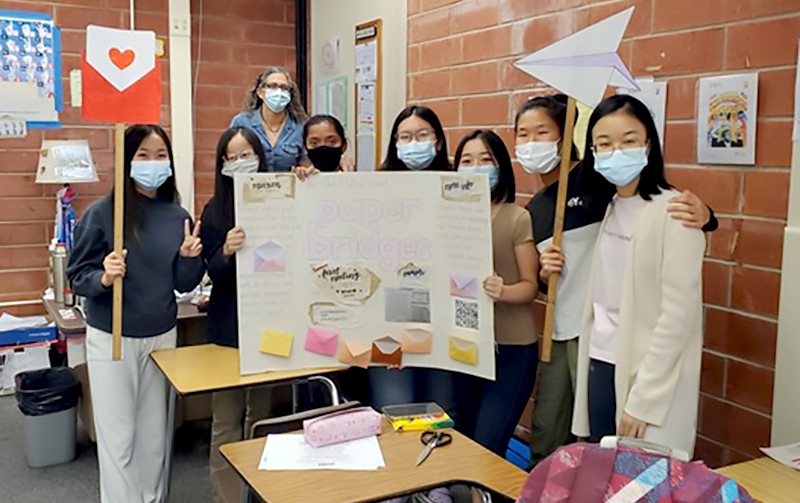As an autistic high school senior, I’ve spent my time in high school juggling 12 AP and IB classes while being a campus leader, whether it be as Vice President of the 60-member club I co-founded or as a cabinet member in an award-winning Science Olympiad team. I’ve also deeply invested myself in autism advocacy, reaching about 2 million people through social media content creation on my Instagram account @m.intymatcha, and working with the Stanford Neurodiversity Project as speaker coordinator for one of its initiatives. Just four months ago, I was given the opportunity to speak on my experiences as an autistic student in front of hundreds at the 2021 Stanford Neurodiversity Summit. For my autism advocacy, I won the Digital 4 Good award, where I’ll give a pitch to the CEO’s of prestigious Silicon Valley tech companies like TikTok and Intel and compete for mentorship to help me further my work towards improving the lives of autistic individuals.

Representing the 60-member club Cynthia Wen co-founded for her school’s Club Rush
From the plethora of accomplishments I’ve listed above, it would seem like my educational journey has been all sunshine and rainbows. Despite this, it definitely hasn’t been and excelling academically hasn’t always been easy for me. There have been times when school faculty have supported me, and there have been times when school has been a barrier to my academic potential. In this article, I’ll discuss both of these times, in the hopes that it reaches a larger audience of educators, parents, and students, looking to advocate for a more inclusive educational environment.
The Don’ts
Don’t give meaningless punishments. In preschool, I was often lectured for talking solely about my special interests, and in elementary, I would have to write “I will not forget my homework” hundreds of times on a piece of paper during recess if I did not remember to bring an assignment. These punishments did nothing but confuse me and make me see the punishment administrator as an enemy. Sometimes, children need to be disciplined, but making them do tasks like these likely won’t do anything except make them dislike you, Since many autistic students aren’t acclimated to social norms, make sure they know why the action they performed was wrong and focus discipline on reflection.
Don’t ban sensory items. When sensory items like fidget spinners and slime became mainstream, public schools like mine rushed to ban them from classrooms as they would be “distracting.” Many autistic students rely on these sensory toys to regulate themselves and taking them away isn’t going to do much except cause meltdowns and force students who are not openly autistic to out themselves should they need the accommodation.
Don’t focus presentation grading on “social cues” such as eye contact, tone of voice, etc. Many autistics struggle with social cues, and something like eye contact can make us very uncomfortable, especially if you have to look at a room with 30 other students staring back! If you’re grading a presentation, focus on the content itself – it’s what matters more than these cues regardless.
Don’t refuse to give accommodations. I’ve heard of teachers who have refused to give disabled students accommodations in the name of “fairness,” which is ridiculous and does much more harm than good. Accommodations exist to give us a level playing field in schools, not to provide them with advantages.
The Do’s
Educate staff on autism and other neurodiverse conditions. So many autistic students are misunderstood and deprived of a positive educational experience because school staff aren’t educated on their disability, and this can be applied to practically every disabled student. And if possible, have teachers teach lessons on neurodiversity (the concept that neurological differences like autism and ADHD are natural and should be embraced)! Bullying is an almost universal experience for any neurodiverse student, and lots of bullying can be reduced simply by educating the student population about people with differences. .
Do allow alternatives for presentations. Many autistic students struggle with social anxiety, and many of them aren’t too great at speaking on the spot or presenting as opposed to their neurotypical peers. That doesn’t mean they’re incapable or process information slower, though – we can be great writers. Teachers that provided alternatives (such as allowing me to write down a memorized text rather than recite it in front of the class) have been tremendously helpful for me. For my Stanford project, I was actually given the questions beforehand to prepare for the interview, which is also a technique that was super helpful!
Do be lenient on policies where you can and try your best to create an inclusive environment! Teachers can be strict with policies, enforcing rules like “No electronics” or “No bathroom breaks.” Even with accommodations, these policies can hurt autistic students, because if they have accommodations, they are singled out and are basically forced to disclose their disability. This goes hand in hand with the “bans on sensory toys” in “Don’ts” – imagine your school having a ban on stress balls, and you use one during class to regulate. Now everyone will know you’re autistic, and you may be more prone to bullying! For me personally, I did not embrace my disabilities until my junior year of high school, so I typically did not use accommodations in class as I was often singled out and interrogated by my peers. Quite obviously, this made my academic performance not as ideal as I would’ve liked it to be. Create a classroom where your students follow your lead because of love or appreciation and not because of fear.
Conclusion
If, after reading this article, you only leave with one piece of wisdom, let it be this: Educate yourself on autism and other disabilities. Don’t just look into medical journals or research papers; educate yourselves from real-life autistics; content creators, friends, family – people who have experienced being autistic firsthand. Autistic people know their needs best, and only with understanding and education on autism will schools become a safe place for autistic students.
Cynthia Wen is Speaker Coordinator for the Stanford Neurodiversity Project’s Network for K-12 Neurodiversity Education and Advocacy (NNEA). For more information, please email Cynthia at cynthiiawen@gmail.com.





